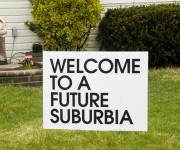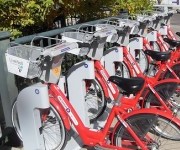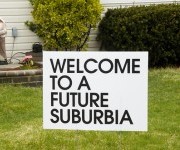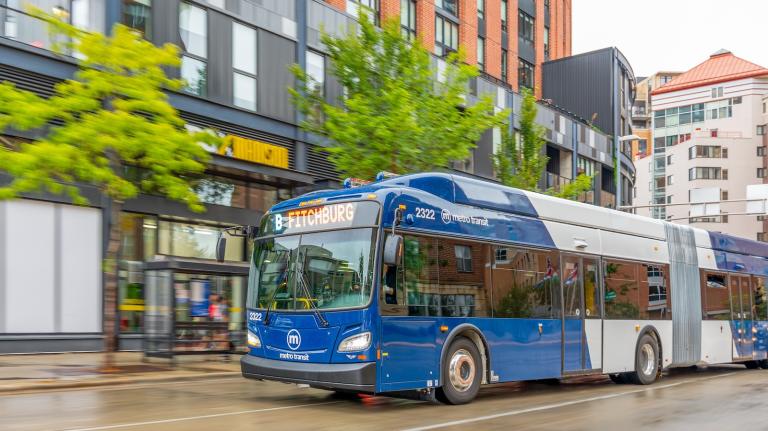
A sign at an open house for the designers’ Levittown retrofit. (Photo by Dave Pinter.)
Retrofitting suburbia to support mixed-use and car-free lifestyles is a sticky wicket. Rambling ranch homes and wide-wide-wide roads seem to discourage the walkability and local commerce people desire. But that hasn’t stopped architects, designers, and the like from pitching their proposals. The latest comes from Dutch design group Droog and New York City-based architectural firm Diller Scofidio + Renfro. The pair set out to retrofit the most suburban of suburbias — Levittown, N.Y.
Most suburban retrofit plans involve plopping accessory buildings in front of or behind houses, or stretching buildings’ original floor plans to add living or commercial space. Droog and Diller Scofidio + Renfro tick both of those boxes, but theirs is more design exercise than serious proposal, so they added a healthy dose of whimsy. Proposed additions to the neighborhood include a literal garage band, a “driveway drive-through,” and a home theater that caters to more than one family.
Greg Lindsay interviewed the project’s masterminds for Fast Co. Design:
“What we think, from looking at New York City, is that this model might be outmoded,” said Diller Scofidio + Renfro partner Charles Renfro at a Saturday morning symposium on the project in Tribeca. “Why not allow people to be in charge of their own futures? As a first step, we thought these residents could be motivated to find their inner service providers,” which led the team to Levittown. “Anybody can be a service provider, and anybody can opt into a service,” at least in New York.
The unique part of this proposed retrofit is its added dimension of entrepreneurship. Many retrofit plans address the physical space, but don’t offer suggestions as to exactly how that space could be used. A storefront could be a coffee shop or clothing boutique, but it’s usually pitched as a simple storefront. The specifics are left as an exercise to the imagined inhabitants. Droog and Diller Scofidio + Renfro go the extra mile.
Many of their suggested applications seem pie-in-the-sky fanciful, but they’re really just subtle masks for very realistic applications. The garage band could easily be rented to creative types, or maybe mechanics, as a literal garage for fixing cars and bikes. The library could easily morph into a bookstore or coffee shop, while the driveway drive-through concept is a suburban take on the food-truck craze that has swept through cities across the country. The front-yard farm is downright practical, even unimaginative, given how popular the idea has become. But the way it blends with the nearby “yard market” is particularly clever. Adding small corner stores like this would do wonders for suburban walkability, and having them buy from neighborhood farms would be a great way to keep it all in the neighborhood.
The Droog and Diller Scofidio + Renfro thought experiment is a nifty set of proposals, and I particularly like the witty way they weave small business into the neighborhood. We need more thought experiments like this. After all, retrofitting suburbia is not going to be easy.




